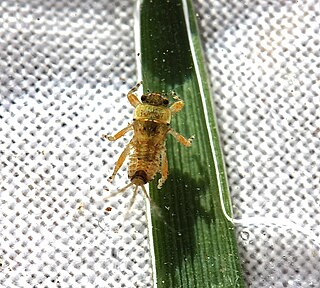
Crambidae comprises the grass moth family of lepidopterans. They are variable in appearance, with the nominal subfamily Crambinae taking up closely folded postures on grass stems where they are inconspicuous, while other subfamilies include brightly coloured and patterned insects that rest in wing-spread attitudes.
Dry fly fishing is an angling technique in which the lure is an artificial fly which floats on the surface of the water and does not sink below it. Developed originally for trout fly fishing.

Ephemerellidae are known as the spiny crawler mayflies. They are a family of the order Ephemeroptera. There are eight genera consisting of a total 90 species. They are distributed throughout North America as well as the UK. Their habitat is lotic-erosional, they are found in all sizes of flowing streams on different types of substrates where there is reduced flow. They are even found on the shores of lakes and beaches where there is wave action present. They move by swimming and clinging, they are very well camouflaged. Most species have one generation per year. They are mostly collector-gatherers.
Ephemerella excrucians, the pale morning dun, is a species of spiny crawler mayfly in the family Ephemerellidae. It is found in all of Canada and the continental United States.

Ephemerella is a genus of spiny crawler mayflies in the family Ephemerellidae with a widespread distribution.
Stenacron floridense is a species of flatheaded mayfly in the family Heptageniidae. It is found in North America.
Isonychia tusculanensis is a species of brushlegged mayfly in the family Isonychiidae. It is found in North America.
Serratella micheneri is a species of spiny crawler mayfly in the family Ephemerellidae. It is found in Central America and North America. In North America its range includes northern Mexico, and the western United States.

Serratella is a genus of spiny crawler mayflies in the family Ephemerellidae. There are at least 20 described species in Serratella.

Paraleptophlebia bicornuta is a species of pronggilled mayfly in the family Leptophlebiidae. It is found in North America.
Ameletus validus is a species of combmouthed minnow mayfly in the family Ameletidae. It is found in southwestern Canada, the western United States, and Alaska.

Drunella coloradensis is a species of spiny crawler mayfly in the family Ephemerellidae. It is found in Central America and North America. In North America its range includes southwestern, northern Canada, northern Mexico, the western United States, and Alaska.
Stenacron gildersleevei, or Gildersleeve's stenacron mayfly, is a species of flatheaded mayfly in the family Heptageniidae. It is found in North America.

Ephemerella invaria, the sulphur dun, is a species of spiny crawler mayfly in the family Ephemerellidae. It is found in southeastern and northern Canada and the eastern United States.
Ephemerella maculata is a species of spiny crawler mayfly in the family Ephemerellidae. It is found in North America.

Ephemerella tibialis is a species of spiny crawler mayfly in the family Ephemerellidae. It is found in North America.
Ephemerella aurivillii is a species of spiny crawler mayfly in the family Ephemerellidae. It is found in Europem, Northern Asia and North America. In North America its range includes all of Canada, the northern, southwestern United States, and Alaska.

Ephemerella dorothea is a species of spiny crawler mayfly in the family Ephemerellidae. It is found in North America.

Blue-winged Olive flies is a collective term used by anglers in fly fishing to identify a broad array of mayflies having olive, olive-brown bodies and bluish wings in their adult form. Sometimes referred to as BWO, a wide array of artificial flies are tied to imitate adult, nymphal and emerging stages of the aquatic insect. While the family Baetidae probably has the most species identified as blue-winged olives, another mayfly family Ephemerellidae also contains some. Collectively, blue-winged olive mayflies are an important food source in most trout streams, thus their widespread imitation by fly tiers.










